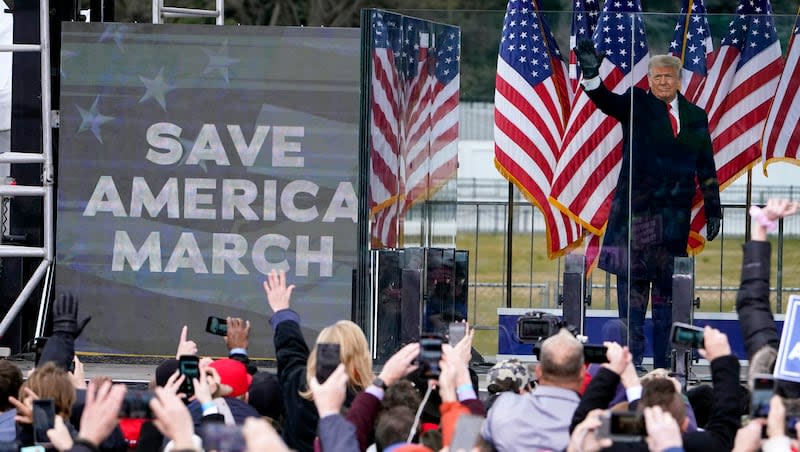Reactions pour in following Supreme Court’s Trump immunity decision

- Oops!Something went wrong.Please try again later.
- Oops!Something went wrong.Please try again later.
Following the Supreme Court’s ruling on Monday regarding former President Donald Trump’s executive immunity while in office, many legal scholars, political commentators and politicians have shared their opinions — including a strong reaction from the White House.
“As President Biden has said, nobody is above the law,” White House spokesman Ian Sams said in a statement, per ABC News. “That is a core American principle and how our system of justice works. We need leaders like President Biden who respect the justice system and don’t tear it down.”
Utah Sen. Mike Lee posted on X following the ruling, “Today’s decision by the Supreme Court is a big win for constitutional separation of powers and a huge loss for those who want to weaponize the federal government against their political opponents.”
Today’s decision by the Supreme Court is a big win for constitutional separation of powers and a huge loss for those who want to weaponize the federal government against their political opponents. pic.twitter.com/u2lggMG20N
— Mike Lee (@SenMikeLee) July 1, 2024
Senate Majority Leader Chuck Schumer, D-N.Y., shared an opposing viewpoint, “This is a sad day for America and a sad day for our democracy,” he posted on X. “The very basis of our judicial system is that no one is above the law. Treason or incitement of an insurrection should not be considered a core constitutional power afforded to a president.”
This is a sad day for America and a sad day for our democracy.
The very basis of our judicial system is that no one is above the law.
Treason or incitement of an insurrection should not be considered a core constitutional power afforded to a president. https://t.co/wCNI42U5Ki— Chuck Schumer (@SenSchumer) July 1, 2024
CNN political commentator Van Jones told CNN’s Anderson Cooper that the top court ruling is “bad” from a political perspective, per CNN. “It makes the Supreme Court look very partisan,” adding that the justices are supposed to be political and objective “umpires” but look more like MAGA supporters. If Trump were to be reelected, Jones said, Monday’s ruling gives Trump a “license to thug in a way,” he said, emphasizing that Trump will be able to do whatever he wants “and the Supreme Court is probably going to let you (Trump) get away with it. That is very frightening.”
On Fox News, constitutional law attorney Jonathan Turley said the majority of the Supreme Court was trying “to find something in the middle” and not fully take Trump’s full immunity claims or the three-judge federal appeals court panel’s ruling back in February that ruled he could not claim presidential immunity.
However, Turley added, “This is a major victory for former President Trump.”
What this mean for Trump’s election subversion case
The 6-3 ruling by the Supreme Court grants Trump — and all other presidents — immunity from criminal prosecution over official actions made while in office, but not over unofficial ones. The justices explained the difference in their ruling:
“In dividing official from unofficial conduct, courts may not inquire into the president’s motives,” the ruling said. Such a ‘highly intrusive’ inquiry would risk exposing even the most obvious instances of official conduct to judicial examination on the mere allegation of improper purpose. ... Nor may courts deem an action unofficial merely because it allegedly violates a generally applicable law. Otherwise, presidents would be subject to trial on ‘every allegation that an action was unlawful,’ depriving immunity of its intended effect.”
Legal proceedings were paused back in February in special counsel Jack Smith’s election interference case against Trump after Trump’s legal team appealed the decision to the Supreme Court. Following the ruling Monday, Smith’s case may not hold enough against the presumptive presidential nominee and is pretty much guaranteed not to reach trial until after the 2024 presidential election. If that were to happen and Trump wins the presidential election, he’s likely to have the Justice Department drop the charges.
Going forward, “(There) are likely to be more hearings, written arguments and even proceedings with witness testimony and debates over evidence before U.S. District Judge Tanya Chutkan in Washington, D.C.,” according to CNN. “Once Chutkan works through the legal issues, it’s possible that more appeals of her preliminary decisions could put the case on hold again — adding in significant delay.”
Chutkan initially planned for the trial to begin in March but had to delay it due to Trump’s immunity appeals. Now, she must apply the Supreme Court’s recent ruling to assess whether any of the allegations against Trump can proceed.
“On remand, the District Court must carefully analyze the indictment’s remaining allegations to determine whether they too involve conduct for which a president must be immune from prosecution,” the court ruling said. “And the parties and the District Court must ensure that sufficient allegations support the indictment’s charges without such conduct. Testimony or private records of the president or his advisers probing such conduct may not be admitted as evidence at trial.”
Smith’s office has yet to comment on the recent ruling publicly.

